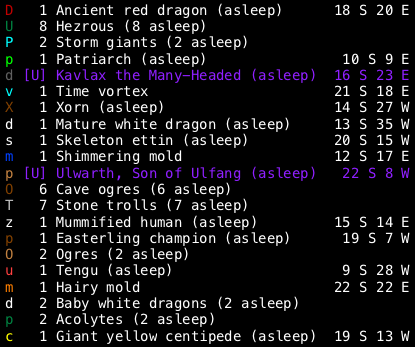

Once you've figured out the laws of character building, you will almost never run into an enemy that is too tough for you to handle. Meanwhile, Sil's exploration is much less interesting.

Assuming you're smart about how you pick your fights, the tension in a fight isn't "will I win?" (if there's any doubt of that, you probably made a mistake picking the fight in the first place) it's "Is winning worth the consumables I'm using?" You pretty much just whale away at it with your weapon/bow/spells and heal periodically. The combat by comparison is pretty simple. If there's a monster in my way, what's the best way to get rid of it? Tunnel around it? Teleport it away with my wand of Teleport Other? Try to kill it? If it's worth exploring, what parts of the level should I avoid? Are there any monstes I do not want to wake up? Is this level worth exploring, or should I head straight for the stairs?

Basically, on each level you ask the following questions: You have to use all the tools available (magic mapping, monster/treasure detection) to figure out where everything is and plan your route through each level. In Angband there are a ton of monsters you can't hope to beat the first time you see them, indeed many of them can one shot a fully healed Half-Troll warrior! As a result, the game's primary challenge is in the exploration. The town makes the early game easier, but it is by no means necessary to enjoy or beat the game and by the midgame or so it becomes much less important.Īs far as differences between Angband and Sil, here are the things that jump out at me: Angband is fundamentally an exploration game, while Sil(-Q) is one of: a stealth game, tactical combat game or a mix of both depending on the build. Furthermore, if you don' t like the town (I don't) don't bother with it. However, you start standing on the stairs, so if you don't want to deal with the town, just hit the `>` and it will take you into the dungeon. So based on that, here are a few thoughts:įirst, Angband starts you in a town. I've even put a fair bit of time into Sil-Q and can get to the endgame pretty consistently, and even managed to win once. I love Angband, and have beaten it a bunch of times. Hope that helps, and happy dungeon crawling! The goal of the game, stealing a Silmaril, is also very thematic, since it comes right out of the Lay of Beren and Luthien. It's a good episode, Scatha talks about the development of the song system in Sil. In episode 155 of Roguelike Radio, Scatha talks about the origin of the Song of Sharpness, though that song was removed in Sil-q for game balance reasons. Song of Lorien and Song of the Trees also have related passages. The Song of Freedom comes from the continuation of the last line: "resisting, battling against power,/of secrets kept, strength like a tower,/and trust unbroken, freedom, escape /of changing and of shifting shape,/of snares eluded, broken traps,/the prison opening, the chain that snaps." The Song of Staying comes from the line: "Then sudden Felagund there swaying,/sang in answer a song of staying." The Song of Staunching comes from the line: "while Lúthien murmuring in the shade/the staunching song, what Elvish wives,/long years had sung in those sad lives,/of war and weapons, wove o'er him." I think it's an interesting topic, so here are some examples. Many of the abilities, mostly the songs, are closely tied to the text as well. A lot of the items are related to people and places from the text, like Helcaraxe, Esgalduin, Aegnoir, Maeglin, Celebrimbor, and many others. Sil is the one that is closely tied to Tolkien lore.Īll of the monsters in Sil come from the text, including some obscure ones like Tevildo, who comes from an early draft of the Lay of Beren and Luthien. I don't have much experience with uMoria, but I can say that while Angband is inspired by Tolkien, it is a large, expansive game that adds a lot from other fantasy sources.


 0 kommentar(er)
0 kommentar(er)
